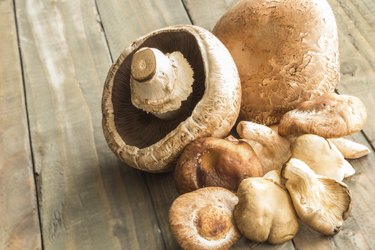
Despite the common notion that bacteria and fungi are infection-causing proponents, a variety of species are beneficial to people. In many cases, they are common food sources. Regularly consuming these organisms can improve your health, while providing a tasty addition to your everyday cuisine. Some items may even include both "good" bacteria and fungi.
Lactobacillus Delbrueckii
Video of the Day
One of the most common "good" bacterial strains present in yogurt is Lactobacillus delbrueckii. This strain is a lactin acid-producing organism. A 2005 study, published in "Applied and Environmental Microbiology," found that the bulgaricus species present in the L. delbrueckii is an effective immunomodulator that also helps lactose intolerant individuals metabolize lactose. It readily survives through the digestive tract, aiding in both metabolic activity and digestion. It helps the body maintain regularity while helping to expel partially undigested build-up within the intestines.
Video of the Day
Aspergillus oryzae and Peiococcus soyae
Aspergillus oryzae is a fungus mostly used in Asian cuisine. For example, it is used in making sake, soy sauce and miso. In soy sauce, the soybeans cook in a mixture of wheat flour and pressed into cakes. The cakes are then placed in a special room that contains the A. oryzae fungal species and left to incubate for up to three days. After this fermentation process, the cake goes through a series of processes, including the addition of the bacteria Peiococcus soyae. It is then left alone for approximately six months, finally creating soy sauce, according to the Department of Botany at the University of Hawaii. Eating foods fermented with Aspergillus oryzae might protect your cells from oxidative damage -- a type of cellular damage associated with genetic mutations -- reports a study published in "Preventative Nutrition and Food Science" in 2013.
Mushrooms
Perhaps one of the most well-known fungal food sources are mushrooms. Widely available throughout the world with varying degrees of specialty, mushrooms are generally regarded as a healthy and delicious food item. Common types you may find in your grocery store include portabella, enoki and shitake. According to the Febuary 2007 Entrepereneur article "Healthy Aspects of Eating Mushrooms," mushrooms provide nutritive value with very low calories. They are also an excellent source of roughage, or insoluble fiber, which helps to quickly move through the digestive tract for improved regularity. White mushrooms also offer ample amounts of antioxidants -- chemicals that prevent or reverse oxidative damage.
- Applied and Environmental Microbiology: Survival of Yogurt Bacteria in the Human Gut
- The Univeristy of Hawaii Department of Botany: Use of Fungi in Food Manufacturing
- Entrepeneur: Healthy Aspects of Eating Mushrooms
- Preventative Nutrition and Food Science: Protective Effects of the Fermented Laminaria japonica Extract on Oxidative Damage in LLC-PK1 Cells
- Penn State University: New Method Shows Mushrooms A Top Source for One Antioxidant
Is this an emergency? If you are experiencing serious medical symptoms, please see the National Library of Medicine’s list of signs you need emergency medical attention or call 911.